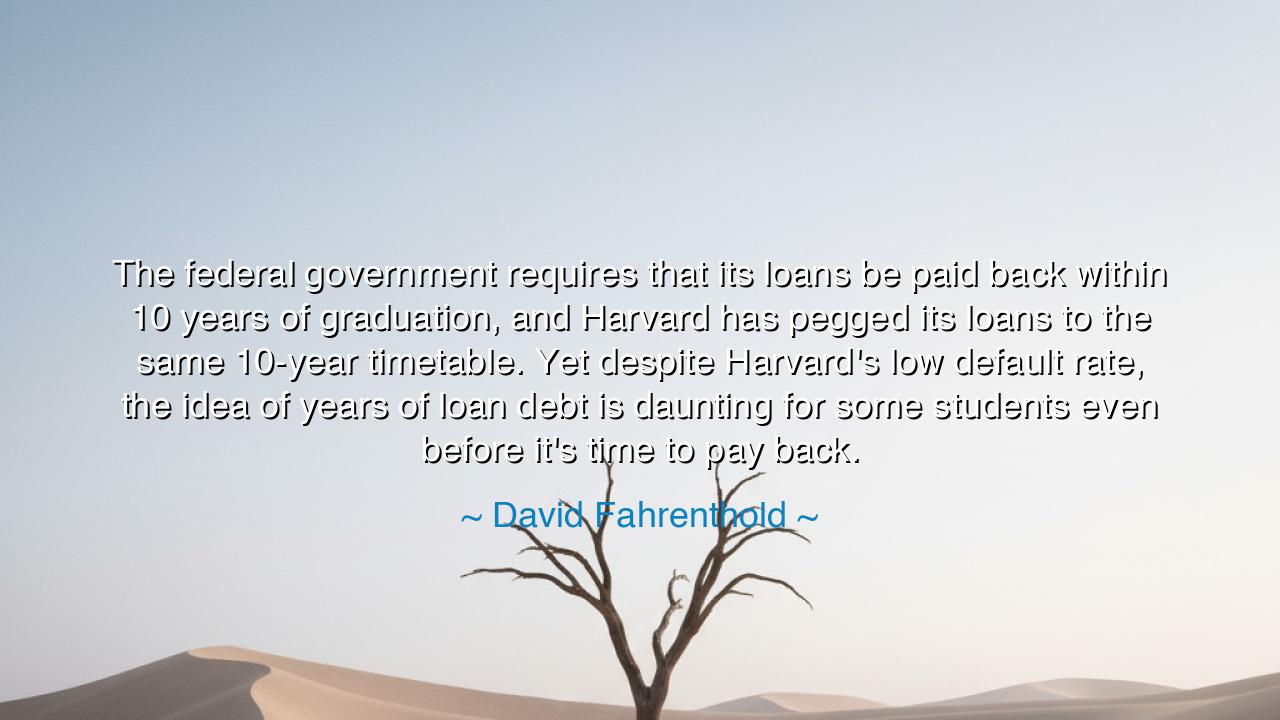
The federal government requires that its loans be paid back
The federal government requires that its loans be paid back within 10 years of graduation, and Harvard has pegged its loans to the same 10-year timetable. Yet despite Harvard's low default rate, the idea of years of loan debt is daunting for some students even before it's time to pay back.






Hear, O listener, the steady and sobering voice of David Fahrenthold, who speaks not of myth or dream, but of the quiet burdens that follow the young into the dawn of their adulthood: “The federal government requires that its loans be paid back within ten years of graduation, and Harvard has pegged its loans to the same ten-year timetable. Yet despite Harvard’s low default rate, the idea of years of loan debt is daunting for some students even before it’s time to pay back.” These words, plain in their telling, strike deep in their meaning. They speak of a generation bound not by chains of iron, but by the invisible weight of debt — the price of learning, the cost of hope, the toll demanded for the privilege of knowledge.
The meaning of this quote lies not only in the arithmetic of loans and timetables, but in the moral story it reveals about education and sacrifice. In ancient days, a student offered devotion to the temple of wisdom — labor, humility, years of apprenticeship. Today, the offering is different but no less binding: money, borrowed from the future self, mortgaged against dreams not yet realized. To seek knowledge now is to carry a burden that lasts beyond the classroom, a burden that shapes not just the pocket, but the spirit. Fahrenthold reminds us that even before the debt is due, its shadow looms large — haunting the hearts of those who wish to rise, yet fear to fall under its weight.
The origin of his reflection lies in the modern struggle between ideal and reality. In America, the land that exalts education as the path to freedom, the road to that very freedom is paved with obligation. The federal loans, the ten-year repayment, the unyielding arithmetic of interest and time — these are the new trials of the scholar. Even at places like Harvard, whose name is gilded in prestige, the ancient promise of enlightenment is tempered by financial fear. The low default rate may comfort the statisticians, but it cannot quiet the anxiety that lives in the heart of the student, who knows that the price of knowledge may delay the pursuit of life itself — a home, a family, the freedom to dream unburdened.
Consider the story of Horace Mann, the father of public education in America. In the 19th century, he fought for the belief that education was not a luxury for the privileged but a birthright for all. He called schooling the “great equalizer of the conditions of men.” Yet, centuries later, that vision trembles beneath the weight of inequality. What was once the ladder to uplift the poor now risks becoming a gate that keeps them out, or a millstone hung upon their necks as they climb. The promise of education — that noble calling — has become entwined with debt, turning aspiration into anxiety.
Still, there is wisdom even in this hardship. For the struggle to bear the cost of knowledge is, in itself, a testament to the value of knowledge. To take on such debt is to declare, “I believe in my future.” It is to plant a seed, knowing the soil is rocky, but trusting that the harvest will come. Yet the wise must learn to balance ambition with awareness — to prepare, to plan, to face the truth of their journey with open eyes. For the mind that seeks knowledge must also seek prudence; the heart that dares to dream must also learn discipline.
There is also a greater calling that Fahrenthold’s words awaken — a call not just to students, but to the society that shapes them. For if knowledge is the torch that lights civilization, then it must not be guarded by gates of gold. The burden of debt is not merely personal; it is collective, for every mind stifled by financial fear is a light dimmed in the world’s horizon. The true test of a nation’s greatness is not in the number of its scholars, but in how freely its people may become one. To make learning accessible is to invest not in individuals alone, but in the future of humanity itself.
So let this be your lesson, O seeker of wisdom: the weight of debt may bend the back, but it must not break the will. If you carry such a burden, carry it with purpose, knowing that every payment, every sacrifice, is an offering to your own becoming. And if you stand in a place of power, work to lighten that burden for those who follow. For the river of knowledge must flow freely if it is to nourish the land.
Take heed, then, of Fahrenthold’s insight — that behind every diploma lies a story of faith and endurance. Let those who teach remember the price their students pay, and let those who learn remember that wisdom is not only what is taught in the classroom, but what is gained in the struggle to reach it. For though debt may bind the hands, learning frees the mind — and no loan, however long, can measure the worth of a liberated soul.






AAdministratorAdministrator
Welcome, honored guests. Please leave a comment, we will respond soon